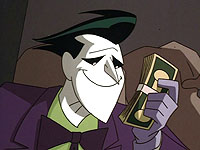|
||
|
| Credits | Cast | |
Written by Paul Dini Directed by Dan Riba Music by Lolita Ritmanis Animation by Koko/Dong Yang |
Kevin Conroy as Batman Tara Charendoff as Batgirl Loren Lester as Nightwing Mathew Valencia as Robin Mark Hamill as The Joker Arleen Sorkin as Harley Quinn Diane Pershing as Poison Ivy |
Paul Williams as The Penguin Jeff Glen Bennett as Jack Ryder John Garry as Joker's Lawyer Sam McMurray as Ernie Allan Rich as King Barlowe Maggie Wheeler as Fake Harley |
|
Actually, it is probably just as well. The creators of the animated series do just fine in the story department all by themselves, thank you very much, and how happy we all are to add "Heart of Ice," "Mudslide," "Mad as a Hatter," and "Perchance to Dream" to the pantheon. But it also remains true that adaptation is a difficult art, and one best not practiced by or in front of the squeamish. Comics and cartoons, despite their superficial similarities, are radically different art forms, and the adapter must be prepared to be ruthless. If he flinches, and approaches his task with too much sensitivity or sentiment, the result won't be pretty. "Joker's Millions" (adapted from "The Joker's Millions" in Detective #180 and reprinted in Batman: The Complete History) is not an episode universally beloved, but it illustrates the process nicely. The original story is easily summarized: The Joker inherits a fortune from a gangster rival and retires from crime. But when the IRS comes to collect on the inheritance tax, the Joker discovers he's been duped by his old rival—most of the money is counterfeit. Frantically, he tries to steal enough money to pay off the IRS without tipping off the fact that he has been victimized, but Batman tricks him into confessing his culpability. A lot of thought went into the original comic. Once having gotten the Joker into the soup, it is in no great hurry to get him out and spends a lot of time showing him plotting and pulling off various small-time crimes as Batman inexorably closes in on him. The comic has a very leisurely pace and in its second half falls into a simple pattern, repeated with embellishments: The Joker complains about having to commit a non-Joker crime; then he commits it; and Batman wonders if the Joker was behind the latest job. Of course, the embellishments never cease being clever, and (more importantly) the lack of momentum or development is not a problem in a comic book, where there is ample time to linger over pretty pictures. Not so with an animated story. So adapter Paul Dini wisely omits the entire cat-and-mouse game to concentrate on the bare bones of the story: The Joker comes into a fortune, dissipates it, falls back into crime, and gets caught by Batman.
So Dini layers in background. The Joker is dead broke; he hasn't even enough money for bullets. Bam! We instantly understand (a) why he is so happy to come into a fortune, and (b) why he is tempted to give up crime now that he is rich. What might have seemed out of character or ad hoc becomes explicable. Similarly, the attitudes not just of Batman but of Batgirl and Nightwing are sketched in with a fight staged in the Penguin's nightclub. The (forgivably) slight story in the comic becomes more textured. Paradoxically, despite being simplified and truncated there is actually more going on in the adaptation than in the original comic. The result is no more serious in tone than the original, though, and excepting "Beware the Creeper" it is probably the silliest thing the producers have ever given us. Still, having seen the show borrow from or be inspired by every other period in Batman’s history (from Kane to Miller), it’s pleasing to see a Silver Age story done so nicely. That’s another dividend paid by good adaptations: When done right they give us timeless sytheses of the classic and the contemporary. |
|
|
|
Related Episodes |
What Others Are Saying ... |
| Back to Holiday Knights |
Forward to Judgment Day |

 Joker's
Millions
Joker's
Millions 
